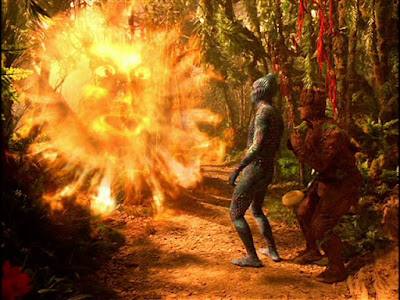 |
| Neelix uses a holo-novel to shield his goddaughter from reality. |
Neelix has been entrusted with the care of his goddaughter, young Naomi Wildman (Scarlett Pomers), while her mother, Samantha (Nancy Hower) is on a mission with Tom and Tuvok in the Delta Flyer. In a transmission to Neelix, Samantha reveals that the ship has been damaged by an ion storm and that another storm is approaching. When that second storm leaves the shuttle limping off course, Voyager prepares a rescue mission.
Guided by his own devastation at the deaths of his family members, Neelix decides not to mention the situation to Naomi - at least, not until they have a clearer picture on how much danger the shuttle crew is in. Janeway initially supports this, and Neelix happily distracts Naomi with a fairy tale-like holo-novel set in an enchanted forest. But as the Delta Flyer's situation grows ever more serious, Janeway starts pushing Neelix to tell the child the truth - finally stating that if Neelix doesn't tell her, then she will!
CHARACTERS
Capt. Janeway: Clearly does sympathize with Neelix's feelings, both his protectiveness of Naomi and his identification with the girl's situation. That doesn't stop her from insisting Neelix reveal the truth when she decides his actions are less for the child and more for himself - But she does deal with him as gently as possible, while still making it clear that she expects him to follow her instructions.
Neelix: His relationship with the Wildmans is carried forward from last season's Mortal Coil. I give points to the show for remembering and building on that. Neelix dodges Naomi's questions about his family, but his grief is evident in both face and tone even as he pretends to the young girl that they're simply "far away." That same sense of loss, remembering how much it hurt him when his family was killed, leads to him shielding Naomi from the truth about her mother's situation, long past the point at which he should be telling her.
TuvoK: Receives one of the episode's most effective moments. When it looks all but certain that she, Tuvok, and Tom will run out of air before rescue comes, she worries about what will become of Naomi. Tuvok, the other parent in the shuttle, manages to be genuinely reassuring without in any way compromising his Vulcan reserve: "My youngest child has been without a father for four years, yet I am certain of her well-being, that I conveyed my values to her before leaving... You have been an exemplary mother to Naomi, and she is in the hands of people you trust. She will survive and prosper, no matter what becomes of us."
THOUGHTS
Glancing around the Internet, it's clear that Once Upon a Time is a badly-regarded episode. I can't argue with many of the criticisms. The holodeck fairy tale, clearly the basis for the episode's title, all but vanishes in the second half; far more interesting narrative use could have been made of continuing the fairy tale through the episode and intercutting it with the Delta Flyer plot. It also is blatantly emotionally manipulative, to the point that you can almost hear writer Michael Taylor (who penned DS9's far superior The Visitor) urging you to be affected, dammit!
All these complaints are valid, and I can't deny them in the slightest. But I have to admit, I enjoyed this episode in spite of that. The manipulations are blatant and heavy-handed... But enough of it does strike a cord. While watching, I found myself rolling my eyes at an extended recording of a deathbed message, but still being affected by the scene even as a part of me mentally mocked it. And the episode's central dilemma - Neelix's emotional turmoil wrestling with a situation that hits so close to home - is perfectly consistent with his overall characterization and is well-played by Ethan Phillips.
I will say that a big part of me wonders if it mightn't have been more interesting had Samantha Wildman died during the mission. That would leave Neelix having to act as a father to Naomi, perhaps allowing his character to develop under this new responsibility - And would also give real emotional consequences to his refusal to tell Naomi the truth. This being Voyager, however, such does not occur, nor does the viewer ever really believe there's any danger of it.
Overall, I can't argue with the episode's poor reputation, but I also can't condemn an episode that I genuinely enjoyed. For all its faults, the story kept me engrossed enough in the character drama to overlook the heavy-handedness. It's too flawed for me to label it a good episode - But I liked it too much to label it a bad one.
Overall Rating: 6/10.
Previous Episode: In the Flesh
Next Episode: Timeless
Review Index
To receive new review updates, follow me:
On Twitter:
On Threads:



